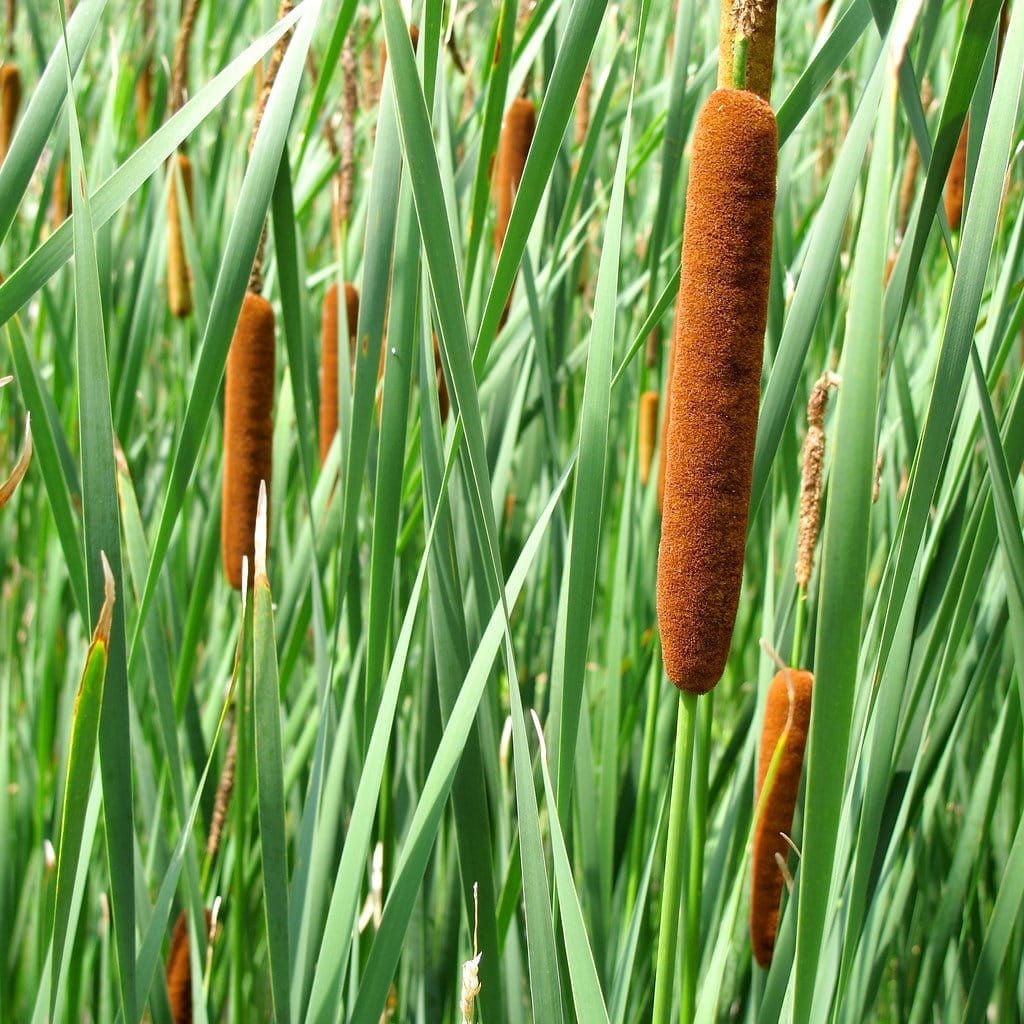Cattail Plant
Cattail Plant
| Order | Percentage Discount | ||
|---|---|---|---|
| 2-5 | 25% Off | ||
| 6-10 | 30% Off | ||
| 11-25 | 35% Off | ||
| 26-50 | 45% Off | ||
| 51+ | 65% Off | ||
Couldn't load pickup availability
5-7 Days
Under 10 Feet
Sun And Shade
3-9
Landscaping
Bare-root
NE. NH. RI. IN. WI. OH. OK.
Cattail Plant - Typha
Cattail Plant is a genus of wetland plants with around 15 species in temperate and tropical regions worldwide. They are commonly known as "cattails," "bulrushes," or "reed mace."They are easily recognized by their long, slender leaves and brown, cylindrical flowering spikes that rise above the plant's leaves. Their flowers are either male or female, and a gap along the point separates them. The male flowers are at the top of the end, and the female flowers are at the bottom.
Where To Find
They are found in various wetland habitats, including marshes, swamps, and wet meadows. They are adaptable plants that can grow in fresh and brackish water. They are essential to wetland ecosystems, providing habitat and food for various wildlife species.
The Cattail Plant Has Been Used Throughout History
Humans have also used them for various purposes throughout history. Native Americans used them for food, medicine, and building materials. Today, they are still used for food, as the young shoots and rhizomes are edible and can be used in various dishes. They are also used in landscaping and erosion control, and their fluffy seed heads are often used in crafts and decorations.
They are hardy wetland plants that grow naturally in moist soil and shallow water along the edges of ponds, lakes, and marshes. If you want to plant them, choose a site similar to their natural habitat.
- Choose a consistently wet location. They prefer moist soil and shallow water and need a constant water source to thrive.
- Make sure the soil is rich. They prefer soil rich in organic matter, such as compost or peat moss. If the soil in your planting area still needs to be rich in organic matter before planting.
- Avoid planting in areas with strong currents. They prefer calm water and may not survive in areas with strong winds.
- Plant in full sun. They need plenty of sunlight to grow and thrive.
- Consider the size of the planting area. They can spread quickly and take over to a large extent, so be sure to plant them where they have room to grow without crowding out other plants.
Planting them may be a good option if you have a low-lying, damp area with plenty of sun.
They are water-loving emergent plants, meaning their root systems grow submerged in water, but the bulk of the plant rises above the water's surface. They can reach up to 7 to 9 feet tall. They cover wildlife, notably birds that nest and mate in the rushes.
When grown along the edge of a pond or waterway, the plants soften the water's edge and provide a dramatic appearance. During winter, the tall plants' distinctive cigar-shaped brown heads hold snow.
Shelter For Wildlife
These plants offer wildlife shelter, and even when they turn winter brown, they add landscape interest throughout the non-growing season. The plants can tolerate both high and low temperatures.
Essential To Ecosystems
Growers interested in permaculture find the plants extremely valuable beyond their aesthetic appeal. They are essential to a pond's ecosystem, and their roots help remove pollutants from water.
The root systems also aid in the decomposition of organic materials that wash ashore. Additionally, the plants act as windbreaks and prevent shore erosion. To successfully grow plants, they must be planted in a moist, boggy environment with a water depth of no more than 1.5 feet.
They spread via their rhizome root system, which requires a constant and consistent water source. Given the right conditions, they increase and spread rapidly.
The plants can also be cut and dried for floral decorations. Their fibrous stalks can be used for arts and crafts, and the decorative heads can be used for several ornaments.
Additionally, planting them is an effective way to filter water and control erosion if your property has a boggy or moist area.
Cattails are easy-to-grow, low-maintenance plants. Commonly found along marshy areas and bodies of water, they have been found to reduce toxins for surrounding flora and fauna.
This Is How Your Plants Will Look upon Delivery
Shipping date depends on the date displayed and chosen when you order from the product's page.
We only accept returns on plants verified dead. If you think your plants have died, we offer a 1 year warranty, please use use this File a Claim Link to verify dead plants and start with return warranty process.



Plants arrived as advertised and ahead of schedule.
I am currently so pleased with the quality of these cattail plants. They were robust tubers...some with sprouts. Planted upon receipt as instructed...almost 6 inches tall already. Still a long way to go before having cattails to enjoy but the rest is up to me.
The cattail roots arrived well packed and looked healthy....as much as one can tell from a root ball. They were planted within an hour of being delivered. The soil was prepared for the appropriate plants and hope springs eternal. Will share an updated review in a couple months to determine my overall satisfaction. I look forward to healthy and mature plants....time will tell.
I received the plants and they look good. I’m planting them today, so I hope they do well.
Cattail Plants - 100 Plants






